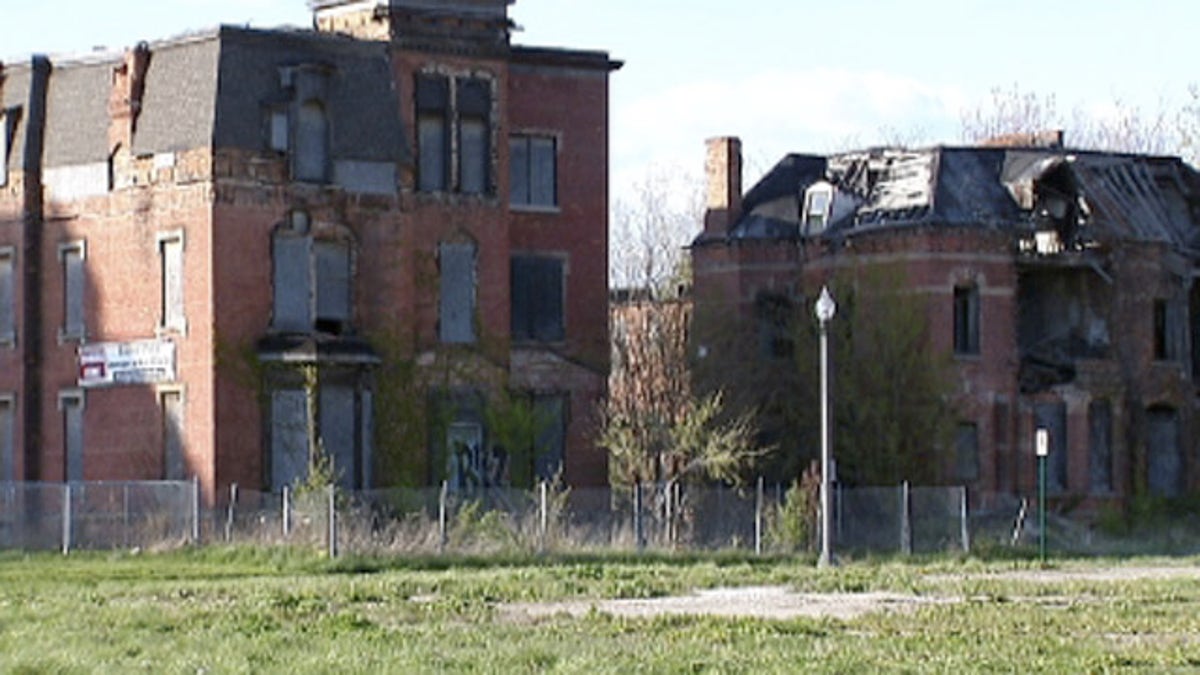
The recession and decline and government mismanagement have contributed to the crumbling of Detroit.
DETROIT – Detroit lawmakers have agreed to use financial advisers to straighten out the city's finances, which has unionized workers vowing protests like those in Wisconsin should their bargaining rights be eliminated in the solutions.
"Get ready,” a union member told Fox News Channel. “This is going to be a huge battle. This'll be just like Wisconsin."
Detroit didn't have much choice in signing the April 4 consent decree, considering it was unable to pay its bills and on the brink of bankruptcy.
"Right now our deficit is at $193 million,” Detroit Councilman James Tate said. “We have a long-term debt of over $12 billion."
Detroit has had financial woes for years.
When the auto industry had to cut jobs, many people left the city. Unemployment was up and revenue was down. What was once a population of two million is now down to roughly 700,000.
But "the city is still operating as if it has two million, and it can't afford that," one state staff member said.
Michigan Gov. Rick Snyder, a Republican, gave Detroit leaders a choice: Agree to work with a financial advisory board to make changes and fix the money problems, or the city will come under the control of an emergency manager, which would mean Mayor Dave Bing, Democrat, and the city council giving up their power.
It wasn't much of a choice, some said, but Detroit was out of other options. City leaders have agreed to work with the nine-member board, and the state gave Detroit $137 million in bailout money to keep things running.
"This agreement paves the way for a good-faith partnership that will restore the fiscal integrity taxpayers expect and ensure the delivery of services that families deserve," Snyder said after the consent agreement was reached.
Now the hard decisions and changes begin, said Wayne State University Business professor Bill Volz. He blames Detroit's cash crunch on antiquated politics and “a series of collective bargaining agreements for which the city couldn't pay."
City leaders basically called the system upside down.
"We have 22,000 retirees with only 11,000 employees paying into the system," Tate said. "There's no way we can sustain that."
Cuts will have to be made in such areas as health care and retirement benefits.
Some jobs likely will be lost, and contracts will have to be altered if the city is going to balance its budget.
Right now the city has 48 different municipal unions. Bargaining over contracts could be combined, but protests over the potential changes already have broken out.
On Tuesday, a small group stood outside city hall in freezing, wet weather, sharing a microphone and chanting: "Democracy now” and "We won't give up our rights."
Union leaders had even talked of trying to recall Snyder, in the same way Wisconsin residents are voting on whether to recall GOP Gov. Scott Walker.
However, Michigan laws are much different from those in Wisconsin, and a recall would be a lot more difficult.
"The fight will continue," AFSCME president John Riehl vowed. "We're kind of being pushed into a corner."
Riehl said the situation could get very ugly.
"If we were to strike and the teachers were to strike all together here in Detroit … we think we'd have the opportunity to shake things up and maybe get some settlement and maybe get some money out of Washington," he said.
City and state leaders, for their part, are calling on the community to work together and just move forward.
"I call it relentless positive action" Snyder said. "No blame, no credit, solve the problem, take on the next one and keep going."
Tate said the time for kicking the debt can down the road is over.
"No more can,” he said. “ No more road.”
Fox News' Steve Brown and Ruth Ravve contributed to this report.




